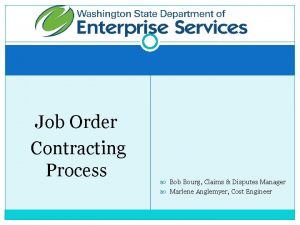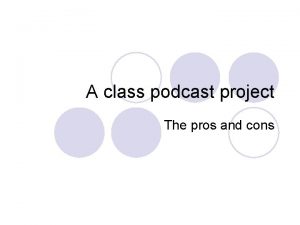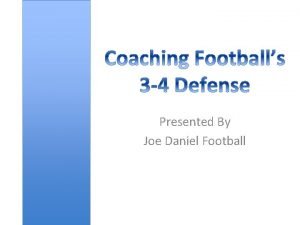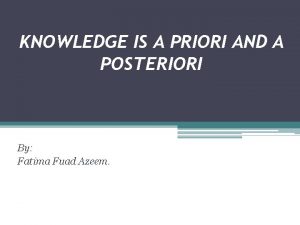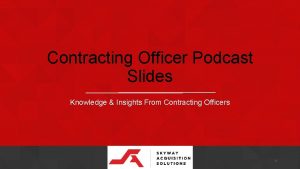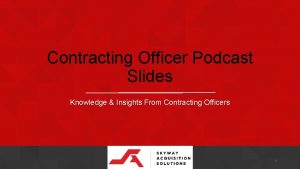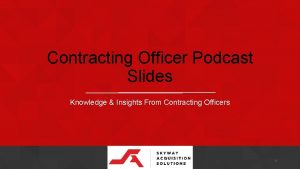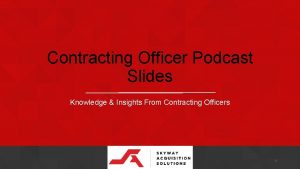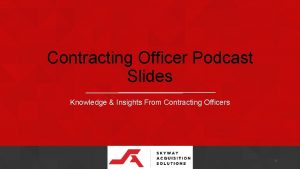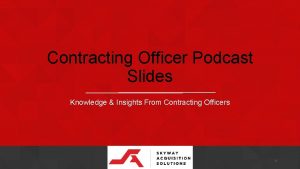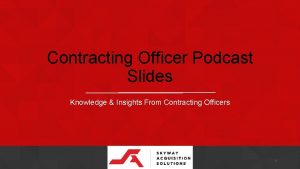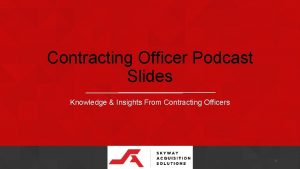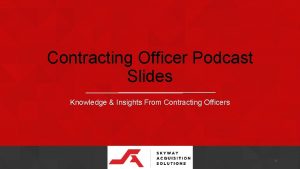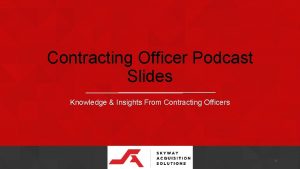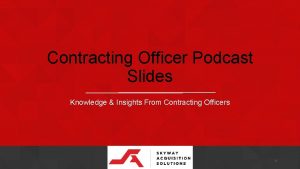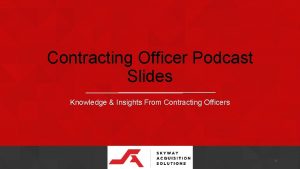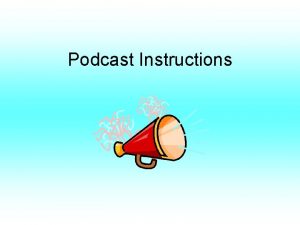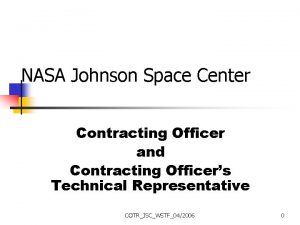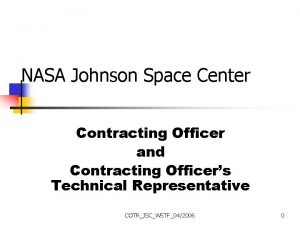Contracting Officer Podcast Slides Knowledge Insights From Contracting




















- Slides: 20

Contracting Officer Podcast Slides Knowledge & Insights From Contracting Officers 1

Episode 044 What are Incentive Contracts? Original Air Date: September 14, 2015 Hosts: Kevin Jans & Paul Schauer 2

Formatting notes • Hyperlinks: Blue font indicates hyperlinks – presentation must be in ‘Slide Show’ mode to activate the link • Red bold font indicates a point of emphasis • Green bold font indicates CO’s personal comment or perspective 3

Introduction • Purpose of this podcast: To explain the intricacies of incentive contracts • Incentive contracts are complex. • They can cost you a lot of time and money in the performance phase if you don’t understand them. 4

The ‘Contract-type’ Continuum • Fixed-price • Extreme is firm-fixed-price, where the contractor has full responsibility for performance costs and resulting profit (or loss) • Cost-reimbursement • Other extreme is cost-plus-fixed-fee, where the contractor has minimal responsibility for performance costs and negotiated fee (profit) is fixed. • Allow payment of “allowable costs” per the contract (and the FAR) • Establish an estimate of total cost and a ceiling 5

Incentive Contracts (In between the extremes) • Three types: • Cost incentives – may share in cost savings • Performance incentives to motivate “better” performance • Delivery incentives to motivate faster delivery 6

When do Incentive Contracts matter? • Acquisition Time Zones (from Podcast Episode 003) • Execution Time Zones (from Podcast Episode 084) • Requirements Zone • Kick Off Zone • Market Research Zone • Performance Zone • RFP Zone (proposal zone) • Re-compete Zone • Source Selection Zone • Wrap-up Zone 7

Incentive Contracts • FAR 16. 401 • Appropriate when: • Fixed price is not appropriate, and • Required supplies or services can be acquired at lower cost or improved delivery or technical performance • By relating the amount of profit or fee payable under the contract to the contractor’s performance. • Incentive contracts are designed to obtain specific acquisition objectives by- • Establishing reasonable and attainable targets that are clearly communicated to the contractor; and 8

Incentive Contracts • Including appropriate incentive arrangements designed to - • Motivate contractor efforts that might not otherwise be emphasized, and • Discourage contractor inefficiency and waste • FAR 16. 401(c) • Two basic categories of incentive contracts: • Fixed-price incentive contracts (see FAR 16. 403 and 16. 404) • Cost-reimbursement incentive contracts (see FAR 16. 405) 9

Incentive Contracts • Fixed-price incentive contracts • Preferred when contract costs and performance requirements are reasonably certain • Usually to the Government’s advantage for the contractor to assume substantial cost responsibility and an appropriate share of the cost risk 10

Examples of Incentives • Options (not actually called an incentive in the FAR) • Awards • Fee (subjective, using award fee plan) • Term (objective or subjective, using award term plan) • Cost Sharing • Performance bonus (settle for minimum solution but bonus for best solution) • Delivery incentives (opposite of liquidated damages) 11

Incentive Contracts (‘in between’) • Need to be • Defined • Valuable • Trackable • Recognize this: • They require more administration! • Complexity drives confusion • Get buy in on administration effort! (this ain't always easy. . . ) 12

Approval Required • Because of ‘perceived abuse’ • FAR 16. 401(d): “A determination and finding, signed by the head of the contracting activity, shall be completed for all incentive- and award-fee contracts justifying that the use of this type of contract is in the best interest of the Government. ” 13

Why are Incentive Contracts important? • Creativity is built into the FAR – This is the thinking part. • The law of unintended consequences applies • For every action there is an equal and opposite reaction • Incentives compete with each other – and compete with rational behavior • Faster, better, cheaper… You can't have all 3 • Cost, performance and schedule move together (like a triangle) 14

Why are Incentive Contracts important? • No incentive contract may provide for other incentives without also providing a cost incentive (or constraint) (see FAR 16. 402 -1(a) ) • Makes sense in Cost-type contract, but seems out of place for FFP • In this case, the FFP is the constraint • Contractors assess how to maximize profit regardless of Government’s goals for the incentives • Will meet the contract requirements, but in the manner that maximizes profit 15

Why Should Government Care? • Focus: it forces the focus on what REALLY matters • Provides (or should provide) clarity on your goals • You may actually pay less for better service • You can get better performance and REWARD great performance • Or, you can spend a lot of time administering and end in the same place 16

Why Should Industry Care? • This is how you make more profit (or any, in some cases) • Make sure the incentives are aligned with delivering what the customer wants • Otherwise, your program will be a mess when the conflicts arrive • You know your customer’s priority (hopefully it matches the incentives) • You can focus on what REALLY matters to the customer • If they’ve properly incentivized it 17

Why Should Industry Care? • Incentives must match what industry can actually do! • Don’t expect a 6 -month lead time item to be delivered in one day 18

Summary • Government can provide more clarity of goals and needs with incentives • Industry can be more successful (make more money) with incentives • Caution: • Know what you’re signing up for. They are NOT easy to administer • Incentive contracts are a powerful way to encourage contractor behavior. • Be sure that incentives align Government needs with contractor’s profitability 19

Contact us • We are on Linked. In, Twitter and Facebook • We also started the Government Contracting Network Group on Facebook. Join us there! • Send your topics to paul@Contractingofficerpodcast. com • For Community support, contact Shelley Hall at shelley. hall@skywayacquisition. com 20
 Contracting officer podcast
Contracting officer podcast Chief contracting officer
Chief contracting officer Starting from rest a marble first rolls down
Starting from rest a marble first rolls down A small child slides down the four frictionless slides
A small child slides down the four frictionless slides Chief knowledge officer job description
Chief knowledge officer job description The openblend podcast
The openblend podcast Tim kight
Tim kight Spin and snout
Spin and snout Podcast project class 12
Podcast project class 12 For adults only podcast hindi
For adults only podcast hindi Podcast storyboard template
Podcast storyboard template M audio podcast factory
M audio podcast factory Joe daniel football
Joe daniel football Hr2 hörrätsel
Hr2 hörrätsel Gertler econ
Gertler econ Knowledge shared is knowledge squared
Knowledge shared is knowledge squared Personal and shared knowledge
Personal and shared knowledge A posteriori knowledge is knowledge that is known by
A posteriori knowledge is knowledge that is known by Knowledge shared is knowledge multiplied
Knowledge shared is knowledge multiplied Street knowledge vs book knowledge
Street knowledge vs book knowledge Knowledge creation and knowledge architecture
Knowledge creation and knowledge architecture
